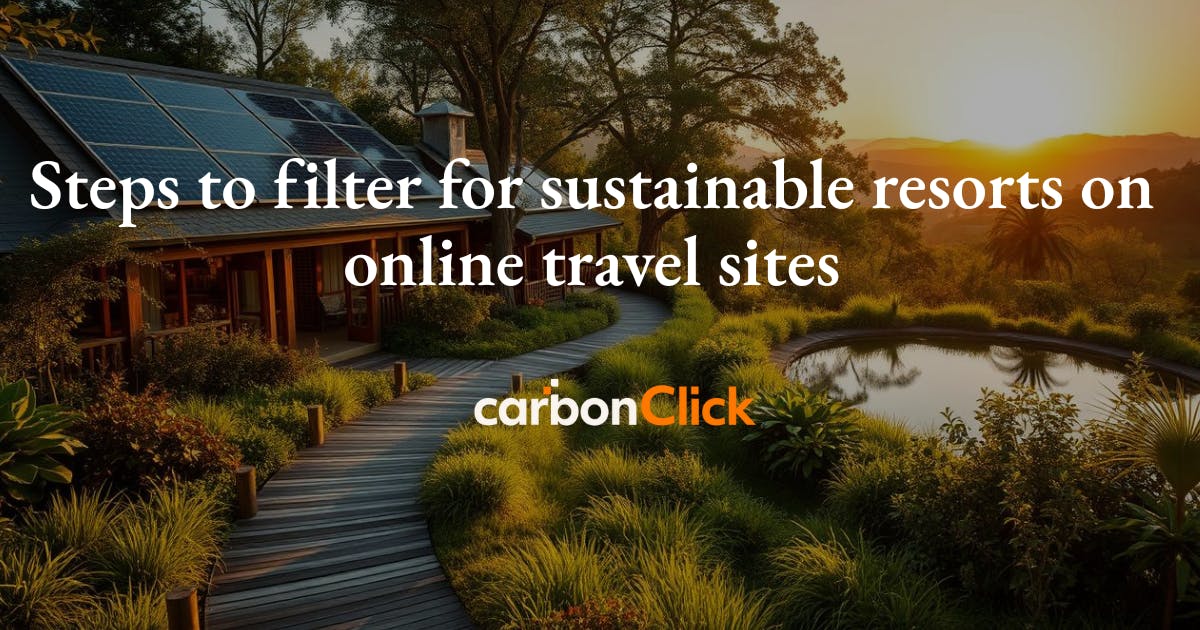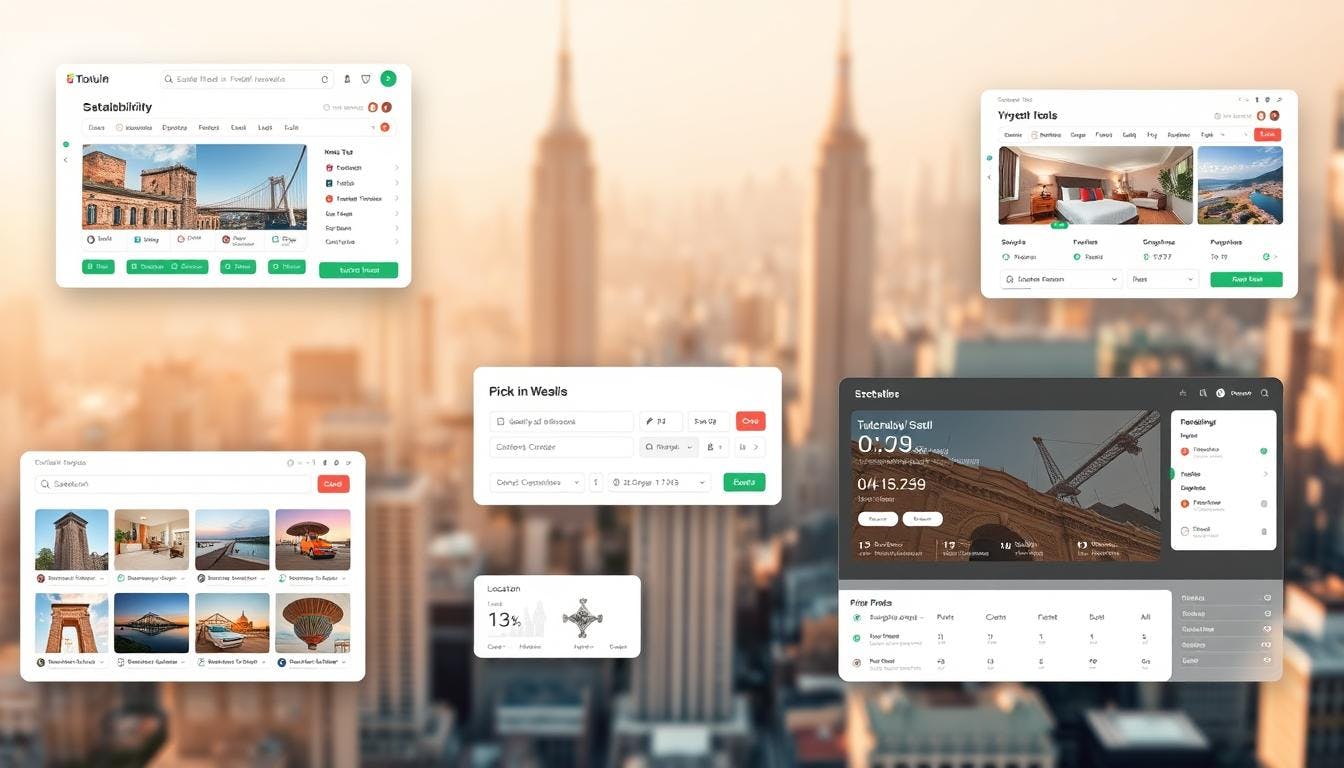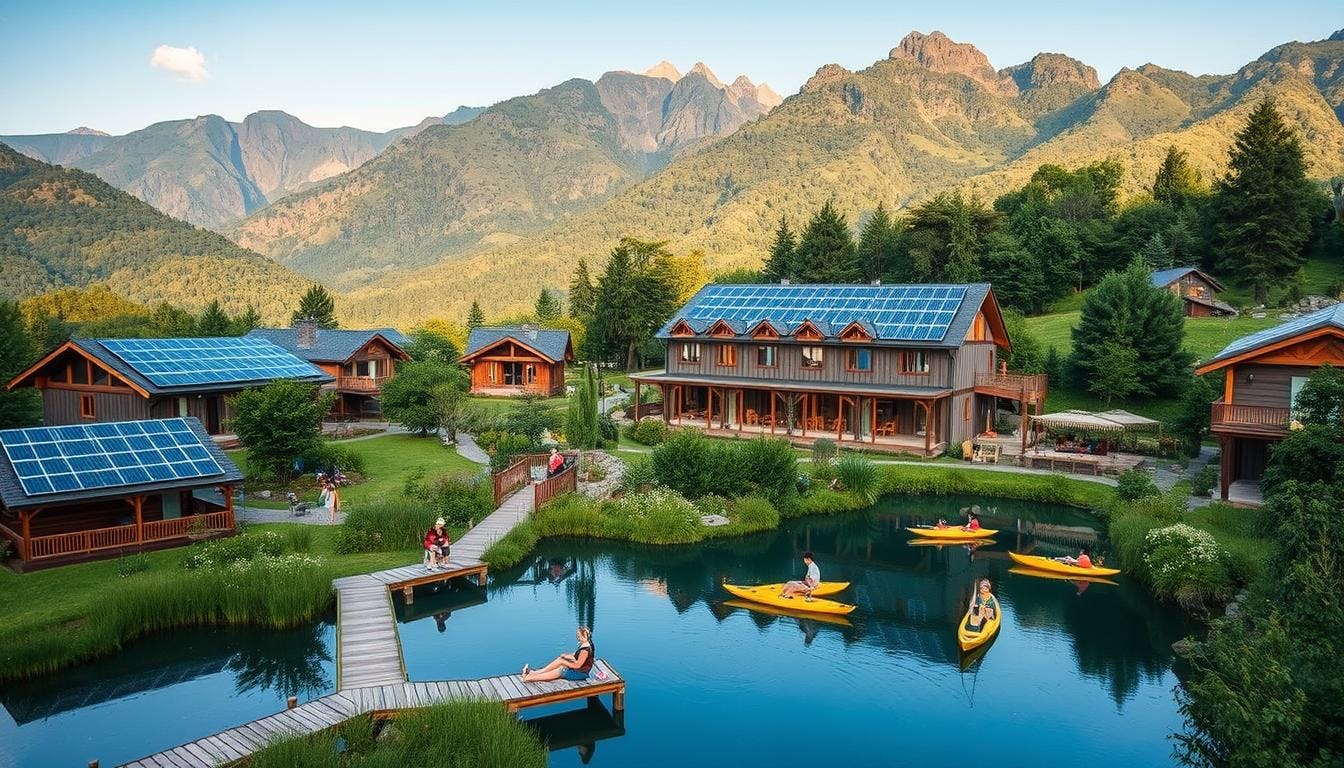Sign up. Be inspired. Get clicking.
Steps to filter for sustainable resorts on online travel sites
Sustainable travel is becoming more popular. It aims to lessen environmental harm and support nature-based places to stay, yet finding hotels that match our values can be hard. Online sites now make it easier to find environmentally conscious hotels. Booking.com's "Travel Sustainable" program helps find verified options. Certifications like LEED and Green Globe also ensure hotels are truly nature-based. Every choice we make helps the planet. By picking environmentally conscious hotels, we support the environment and make a difference.

Why sustainable travel matters
Global ecosystems are much changed by the travel sector. It makes eight percent of the global carbon emissions. Travelers should thus give their environmental impact top attention.
Reducing this impact depends much on environmentally friendly hotels. They follow policies meant to reduce water and electricity waste. Many also support local habitat preservation, so promoting biodiversity.
Selecting low-impact lodging helps nearby businesses as well. Unlike corporate chains, locally owned hotels retain 65% more income in the surrounding area. This promotes economic development and helps to create employment.
The bulk toiletries project of InterContinental Hotels lowers plastic waste.
Overtourism compromises delicate ecosystems such as the Maldives.
Choosing sustainable travel lets people help to change things. It helps the surroundings as well as the local businesses.

Understanding sustainable resort certifications
Certifications help us find real low-impact hotels. They ensure hotels meet strict environmental standards. Third-party verification adds credibility, helping us make better choices. EarthCheck is a leading program, auditing over 1,300 properties. Green Key requires hotels to use at least 50% local and organic food. These certifications set high standards for sustainability.
When comparing certifications, LEED focuses on energy and building design. Green Globe emphasizes social and environmental responsibility. Green Key focuses on low-impact operations and community engagement. Each has unique strengths, catering to different aspects of sustainability. EarthCheck stands out with its 28-year track record. It provides measurable results, ensuring continuous improvement in environmental practices. This makes it a trusted choice for nature-conscious travelers.
However, not all certifications are equal. Some lack third-party verification, leading to greenwashing. Travelers should look for certifications with clear criteria and independent audits.
Here’s a checklist to verify a hotel’s sustainability claims:
- Renewable energy use
- Waste diversion rates
- Fair wages for employees
Regionally, Ecotourism Australia certifies over 200 properties. These certifications highlight the importance of supporting low-impact hotels that benefit both the environment and communities.
Steps to filter for sustainable resorts on online travel sites
Finding low-impact places to stay is now easier thanks to online booking tools. Many websites have filters to help you find green hotels. These tools let you choose based on real sustainability efforts. Booking.com is a leader with its "Travel Sustainable" filter. It shows hotels with low-impact levels and badges for clear info.
Agoda focuses on Southeast Asian hotels with a similar system. It ensures travelers find hotels that fit local green efforts. This makes it great for nature-conscious travelers in Asia. TripAdvisor’s GreenLeaders program checks hotels for green standards. They look at energy use, waste, and community work. This badge helps find verified green hotels.
EcoHotels.com only lists GSTC-certified hotels. This means all options meet strict green criteria. It's a top choice for verified low-impact stays. Book Different, however, adds extra steps over Booking.com’s filters. While it highlights green hotels, its features are similar to others. Travelers might find it less useful.

What to Look for in a Sustainable Resort
Choosing real low-impact places means looking at specific practices and certifications. Look for hotels using renewable energy like solar panels. Carneros Resort in Napa Valley uses geothermal heating to cut down on carbon emissions. Waste management is also key. Resorts should reduce single-use plastics and recycle well. SLEEP’N Atocha in Madrid is carbon neutral thanks to solar energy and local offsets, setting a high green standard.
Energy efficiency shows a resort's green commitment. Look for LEED-certified buildings, EV charging, and linen reuse. These signs show a big effort to lessen environmental harm. Food sourcing matters too. Resorts using local ingredients have a smaller carbon footprint than those with imported food. Also, look for bike rentals or shuttle services for a greener stay.
Be careful of token gestures like towel reuse programs without broader changes. True sustainability needs efforts in all operations. Travelers can make informed choices by focusing on these factors.


How to verify a resort’s sustainability claims
Verifying low-impact claims can be tough. Green-Key audits check if hotels manage waste well. Yet, many hotels, even eco-certified ones, struggle with waste, with up to 40% failing waste audits. Start by checking certifications on GSTC.org. This ensures the resort meets environmental standards. Also, look at TripAdvisor reviews for guest feedback on nature-based practices.
Ask direct questions to get more info. Inquire about energy bills, staff training, and waste systems. Fairbnb.coop, for example, uses 50% of booking fees for local projects, showing transparency and community impact. Watch out for greenwashing. Some resorts claim to be plastic-free but serve unsustainable seafood.
Top online platforms for booking sustainable resorts
Choosing the right platform for nature-supportive stays is key. Many platforms connect travelers with green accommodations. They ensure bookings support the environment and communities. EcoHotels.com plants a tree for every booking through reforestation projects. It's a top choice for those who care about the planet. Regenerative Travel audits over 50 luxury properties yearly. This ensures high sustainability and quality standards.
Kind Traveler requires a $10 charity donation per booking. This supports local communities and promotes nature-supportive travel. Oliver’s Travels offers European villas with carbon offsetting through Tree-Nation. They have 198 properties, blending luxury with green practices. Airbnb is vast but lacks sustainability filters. This makes finding nature-supportive options hard. Fairbnb, however, supports local projects with 50% of booking fees. This shows the value of transparency and community impact.
When picking a platform, think about its fees and green efforts. EcoHotels.com has a lower fee than Booking.com, which is 15-25%. This makes it a good choice for those wanting nature-supportive places to stay. Choosing platforms that focus on the planet helps reduce harm. These sites offer green places to stay and help projects around the world.

Tips for being a sustainable traveler
Traveling green can make a big difference. Simple actions, like using towels for more than three days, can save a lot of water. This helps save energy and resources. Choosing hostels over hotels can also cut down on carbon. YHA Australia, for example, uses 40% less energy per guest than hotels. These places are affordable and support green living.
Bring items like reusable utensils and sunscreen that's safe for reefs. Also, download maps instead of using data to save energy. These small steps help a lot. How you get around is key to green travel. Choose trains over buses and hybrid cars over big SUVs.
Respecting local cultures and lands is important. After traveling, consider offsetting your flight emissions. These actions help the planet.
Making informed choices for a more efficient Future
Every booking helps the planet. For example, a million travelers choosing green hotels can save a lot of water. This shows how travel can be good for the environment. We need big changes. Demand green options on all booking sites. Share your green stays on social media to inspire others. The EU will soon require hotels to report their carbon use. Use this checklist for your next trip to choose sustainable options. Together, we can make a difference and support local communities.
17 South Street
Auckland 1010
New Zealand
info@carbonclick.com- -
- X
Subscribe now to stay up to date with CarbonClick, carbon offsetting and climate action.
By signing up you agree to our Privacy Policy.


